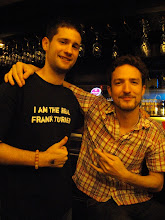There are 2 major parties here: The Kuomintang (or KMT) and the Democratic Progressive Party (or DPP). The KMT are the oldest of the two, tracing its roots back to the time when the Japanese had colonized Taiwan, with its founder being Sun Yat-sen.
The KMT is a nationalist party, with a goal of having Taiwan reunited with mainland China. KMT is the current political party in control of the government here in Taiwan, with legislative elections scheduled for 2010 and the presidential election and other legislative elections scheduled for 2012.
The President of Taiwan, a KMT politician, is Ma Ying-jeou. Similar to the US President, Ying-jeou came into power because of a disgruntled population from an unpopular DPP-led government. Similarly to the US, the DPP had held power from 2000-2008, but with scandals involving politicians – including the President of Taiwan in a money laundering scandal – and with a poll rating as low as 5.8%, the KMT won a landslide victory in 2008 in both the legislature and the Presidency.
The DPP is a newer political party in Taiwan. The official formation of the DPP was in September 1986, and in 2000 it won the Presidency for the first time, ending more than half a century of KMT-led government rule.
During the rule of KMT’s “President” (or dictator), Chiang Kai-shek, a time known in Taiwan as “The White Terror” (although it spanned into July 1987), very little in the way of Democratic elections were achieved. Other political parties were banned, people of conscience were arrested, detained and even executed. With the death of Chiang Kai-shek in 1975 and the gradual liberalization of policies and politics from then until the early 1990’s, Taiwan began fostering a more open, democratic system, with a dual party system.

The DPP’s current politics towards America and Americans are quite different. The DPP’s current talking points are that the American government rips Taiwan off when we sell them weapons, feels that the beef imported from the US should be banned because we send them beef tainted with mad-cow disease, and they believe that the US sold Taiwan out by transferring the official recognition of China from Taiwan to mainland China in 1979.
The KMT’s current politics are to open up economic and political relationships with China. In the past year and a half, direct flights from Taiwan to mainland China have begun for the first time. Direct investment in telecommunications from China have been allowed in Taiwan, and direct foreign investment from China have been allowed. All these developments are major steps towards reconciliation with China.
As of this writing, the KMT is not looking very good for the election this year, and the President is looking less and less popular each week. It seems like the DPP could be the Republicans and the KMT could be the Democrats…

2 comments:
You've got the DPP backwards, except for the beef issue. The DPP supported weapons sales, the KMT blocked bills to purchase weapons over 60 times in the legislature during the Chen Administration. The DPP has consistently supported weapons purchases from the US.
Chen's polls ratings hovered in the 20s -- the 5.8% was a push poll designed to produce that result.
Both the DPP and the KMT want to have trade with China. The DPP's position is that we can engage China without selling the island out; the KMT, not so much. Direct investment in telecommunications is not being permitted at present.
Michael
Hey Michael,
Welcome to the blog! A lot of what I write comes from talking with people here in Taiwan - whether it be in night markets or friends that I've met. With that being said, if I was told something that inaccurate, I wouldn't be surprised.
Foreign telecommunications investment is not illegal - only if it's more than 49% of a company, and this issue is being reviewd right now - though a complicated investment. http://www.etaiwannews.com/etn/news_content.php?id=1195122&lang=eng_news&cate_img=logo_taiwan&cate_rss=TAIWAN_eng
Thanks for your input, and feel free to comment as often as you would like!
--RJ
Post a Comment